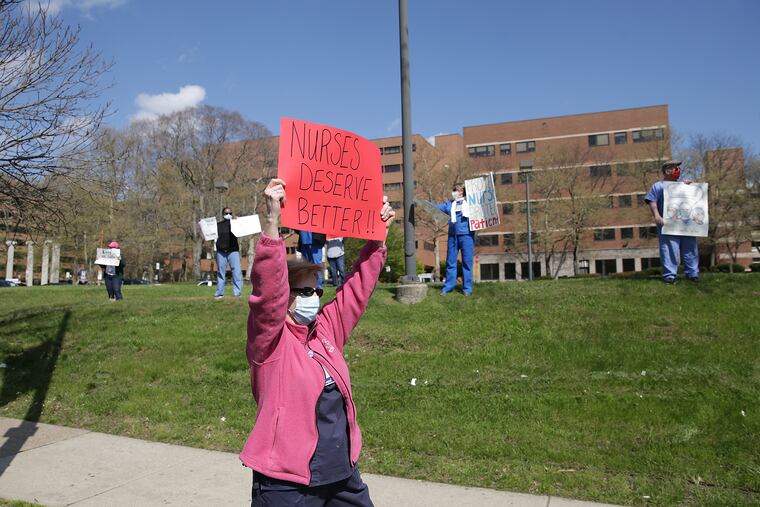Philadelphia’s Einstein nurses score victory after threatening to strike during coronavirus surge
It was a show of what essential workers can win in a pandemic.

In a show of what essential workers can win in a pandemic, 1,100 nurses at Einstein Medical Center in North Philadelphia have reached a contract deal with their employer after threatening to go on strike during the current COVID-19 surge.
The deal includes a coveted “successorship” clause that ensures a future owner will honor the contract — a major victory for the nurses, as Einstein is slated to be acquired by Thomas Jefferson University, pending a federal judge’s decision on a Federal Trade Commission antitrust lawsuit.
Successorship has become an increasingly common demand at the bargaining table in industries undergoing rapid consolidation, such as health care and media.
In Philadelphia, some health-care workers have become textbook examples of why a successorship clause is so important: Nurses at St. Christopher’s Hospital for Children, who are represented by PASNAP, the same union representing the Einstein nurses, lost their contract and their hard-won patient/nurse staffing limits, when Tower Health and Drexel acquired the hospital last year and refused to honor a contract they did not bargain. The 500 nurses at St. Christopher’s, who are still without a contract since the September 2019 acquisition, voted to authorize a strike earlier this month.
» READ MORE: Jefferson’s CEO boasted of beating IBC executives if his system could merge with Einstein
The Einstein contract, which took nearly a year to bargain and was stalled by COVID-19, maintains protections against staffing reductions and adds about 17 full-time employees, the union said. It won nurses an average raise of about 7.5% over a 2½-year period. Under the new contract, a nurse with up to one year of experience makes $35 an hour, while the top of the wage scale, for nurses with more than 35 years of experience, is nearly $53 an hour.
Einstein spokesperson Damien Woods said that “negotiations this year took longer and were complicated by the COVID-19 pandemic” but that the “fair, competitive contract ... allows [Einstein Medical Center] to continue delivering the high-quality care our community expects from Einstein.”
In the year ending June 2019, Einstein Healthcare Network CEO Barry Freedman’s total compensation was nearly $4.1 million, according to federal records. The previous year, his total compensation was $2 million. Freedman, who’s been Einstein’s CEO since 2003, plans to retire at the end of the year.
Nurses at four area hospitals, including Einstein and St. Christopher’s, threatened to go on strike earlier this month in response to a contract stalemate over minimum staffing levels, among other workplace protections.
» READ MORE: As coronavirus cases rise, 800 Bucks County nurses go on strike over ‘dangerous’ staffing levels
It was a power move for the some 2,200 workers because of the sharp increase in coronavirus cases and hospitalizations, as well as the current public support for health-care workers, who have been painted as heroes as they risk infection to care for the sick.
One group of nurses, the 800 workers at St. Mary Medical Center in Langhorne, Bucks County, went on strike Tuesday and Wednesday. Trinity Health, their employer, refused to let them go back to work until Sunday morning, saying that’s how long it would take to safely transition work away from replacement nurses. It’s a common tactic used by employers during strikes called a “lockout.”
This week, Gov. Tom Wolf reached out to Trinity to encourage the Catholic health chain to settle the contract, Wolf’s spokesperson, Lyndsay Kensinger, confirmed.